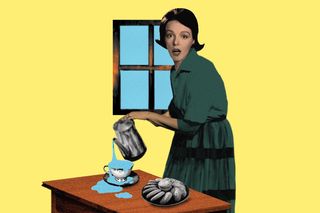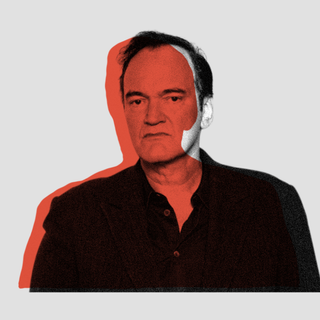
Is This Normal? “I Can’t Do Anything Right While I’m Being Observed”
“It’s as though the awareness of having someone’s eyes on me, prevents me from exercising control over my limbs.”

In this series, we dig into our strange phobias, fixations, and neuroses, and ask ourselves — Is This Normal?
Left to my devices, I can cook a perfectly decent three-course meal by myself. However, if there’s another person present in the kitchen while I cook, I’m bound to burn some dishes; spill oil, water, eggs, and what have you, all over myself, my cat, and the kitchen counter; and completely mess up the proportions of spices in the recipes. This isn’t just a kitchen problem, though. More often than not, I fail to do things right when I know I’m being observed. It’s as though the awareness of having someone’s eyes on me, prevents me from exercising control over my limbs.
What’s assuring, though, is that I’m not the only person to experience this. “The last time I took a driving test, I had been driving regularly for years… Failed it twice because the tester was there,” wrote a Reddit user. explaining how they got nervous as a result of being watched and assessed.
Basically, then, as a Quora user had pointed out, “[P]eople don’t perform worse when someone is watching them, they perform worse when they know that they are being watched. Quite a difference there.” One question still remains, though: is this normal?
As the Quora user had hypothesized, “[W]hen people realize that they are being watched, their focus gets split between what they’re doing and about what possible impression they are making upon the observers. When you’re not putting all your focus on the task at hand, obviously, you aren’t doing as [well] as you otherwise [would have].”
Related on The Swaddle:
The ‘Spotlight Effect’ Is When You Think People Are Noticing Your Flaws More Than They Really Are
Evidently, there’s some truth to this hypothesis. According to a 2016 study published in Scientific Reports, our brain networks are wired to make us stumble when we’re anxious about being watched.
Using functional magnetic resonance neuroimaging (fMRI), the researchers were able to zero in on the brain region behind the performance mishaps. They found that the inferior parietal cortex — an area of the brain that allows us to control our sensorimotor functions — was often deactivated by the awareness of being observed. This part of the brain, the researchers noted, was connected to our action-observation network that plays a part in the process of “mentalization,” which was defined as the way in which we “infer what another person is thinking, based on [their] facial expressions and direction of gaze.”
Rather unsurprisingly, it appears that anxiety might make the mishaps worse. “We realized that [the action-observation network] might also be related to performance anxiety because when being scrutinized, we tend to care about how the audience is feeling about us and our performance,” explained the study’s lead author Michiko Yoshie who was affiliated to the department of psychiatry at the Brighton and Sussex Medical School in the U.K. at the time of the study.
Performance anxiety can also make us choke under pressure — resulting in a performance that’s poorer than expected, in terms of both our skill sets and our practice. Experts note that when we’re performing a routine task, the activity in the prefrontal cortex of the brain — that otherwise aids decision-making and focusing — is reduced. This allows the circuits responsible for carrying out the task to do their jobs, undisturbed and unimpeded. However, “when performance anxiety becomes overwhelming, the prefrontal cortex kicks into high gear and interferes with activity in these brain circuits, leading a person to fumble and choke under pressure,” explains Levi Gadye, who holds a Ph.D. in neuroscience.
Related on The Swaddle:
How Extreme Self‑Focus Can Prevent ‘Shy’ People From Bonding With Others
It’s possible that the anxiety might also spawn a vicious cycle of mishaps — as a result of messing up repeatedly, one might internalize the idea that they’re “good-for-nothing” or “useless,” resulting in them worrying about being told the same by others who are watching them work, and in the process, messing up yet again as a result of being anxious.
“It’s important to believe that the audience is supporting you and wishing for your successful performance… To strengthen such belief, you should sometimes have opportunities to perform in front of your supporters,” advised Yoshie, recommending that “[B]efore an actual public performance, a musician could perform in front of [their] family and close friends and receive a lot of applause. Such experience would help you to induce a desirable activation pattern in your brain and boost self-confidence.”
The aforementioned Reddit user, too, shared their experience of mitigating — if not overcoming — the overpowering anxiety that being observed can induce. “The thing that helped me the most as an adult [was] a couple of public speaking courses I took… Basic exposure therapy: put yourself in the situation in a low-threat environment, learn the techniques that the instructor provides, and practice. It won’t go away, but you’ll learn a lot about handling the anxiety,” they noted.
Well, I suppose it’s worth a try: perhaps, I’ll ask my partner to be my audience as I cook myself some eggs mosaic tonight. And, hopefully, the yolks will land on the pan rather than on my cat’s back.
Devrupa Rakshit is an Associate Editor at The Swaddle. She is a lawyer by education, a poet by accident, a painter by shaukh, and autistic by birth. You can find her on Instagram @devruparakshit.
Related


How Julia Fox Disrupts Female Celebrity
